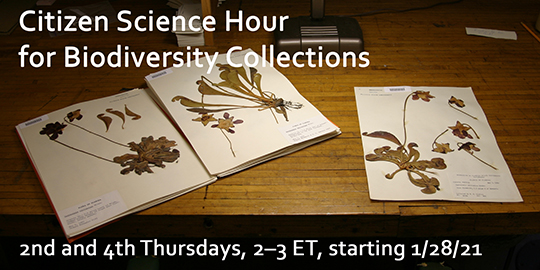Webinar Series: Citizen Science Hour for Biodiversity Collections: Difference between revisions
Austinmast (talk | contribs) |
Austinmast (talk | contribs) |
||
| Line 43: | Line 43: | ||
==='''February 11, 2021: Citizen Science in Higher Education'''=== | ==='''February 11, 2021: Citizen Science in Higher Education'''=== | ||
====Speaker==== | :====Speaker==== | ||
[https://www.brandeis.edu/facultyguide/person.html?emplid=8b1b5f8a78311b66c0779712fdf473fc0f5fdb5d Colleen Hitchcock] — Associate Professor, Biology Department and Environmental Studies Program, Brandeis University | :[https://www.brandeis.edu/facultyguide/person.html?emplid=8b1b5f8a78311b66c0779712fdf473fc0f5fdb5d Colleen Hitchcock] — Associate Professor, Biology Department and Environmental Studies Program, Brandeis University | ||
====Additional Resources==== | :====Additional Resources==== | ||
To be added. | :To be added. | ||
==='''February 25, 2021: The Future of Citizen Science'''=== | ==='''February 25, 2021: The Future of Citizen Science'''=== | ||
Revision as of 13:44, 13 January 2021
Registration
Register here at EventBrite! **You can register for any one webinar day and use the provided Zoom link for all days.** Everyone is welcome, but please note that presentations will be in English.
PLEASE NOTE:
By attending iDigBio’s online events, you accept that the event will be recorded and posted for later asynchronous viewing.
Motivation
This webinar series is dedicated to catalyzing excellence in citizen science that engages biodiversity collections. Citizen science is public engagement in scientific research, and it has the valuable potential to simultaneously advance research, science literacy and participation, and project sustainability, among other goals. Biodiversity collections curate about 3 billion specimens (insects on pins, fossils in drawers, fish in jars, plants on sheets, etc.) worldwide, and these are critically important to research that puts present day diversity and distribution in context and models the future of Earth's biome. These collections range widely in their institutional settings, including museums, botanical gardens, universities, field stations, government research centers, and other places.
While iDigBio's mission focuses on specimen digitization, data sharing, and data use, this series is intended to encompass all opportunities that citizen science might offer to the collections community and complementary sectors of that community's institutions. The series is targeted at an audience of collections curators, researchers, educators, and affiliates.
The need for something like this webinar series was recognized during the 2020 Biodiversity Summit that iDigBio hosted for the leadership of projects funded by NSF’s Advancing Digitization of Biodiversity Collections program. A follow-up survey of the community led to a winnowing of 22 potential topics down to a set of high-priority topics that we are aiming to schedule into two parts: the first, more general cluster between January and May; the second, tool-focused cluster between May and September. The webinar series might continue beyond September, based on audience interest.
Schedule
The webinar is scheduled for the second and fourth Thursday of each month from 2–3 pm ET, starting January 28, 2021. Titles, speakers, links to additional resources, and recordings will be aggregated below.
January 28, 2021: Opportunities Provided by the 2021 Global Citizen Science Month, including City Nature Challenge and WeDigBio
Speakers
Libby Ellwood — Global Communications Manager, iDigBio, Florida Museum of Natural History, University of Florida
Lila Higgins — Senior Manager, Community Science, Natural History Museum of Los Angeles County
Caroline Nickerson — Program Manager, SciStarter
Alison Young — Co-Director, Citizen Science, California Academy of Sciences
Additional Resources
February 11, 2021: Citizen Science in Higher Education
- ====Speaker====
- Colleen Hitchcock — Associate Professor, Biology Department and Environmental Studies Program, Brandeis University
- ====Additional Resources====
- To be added.
February 25, 2021: The Future of Citizen Science
Speaker
Jennifer Shirk — Executive Director, Citizen Science Association
Additional Resources
March 11, 2021: Ethical Considerations in Citizen Science
Speaker
Lisa Rasmussen — Professor and Graduate School Faculty Fellow, Philosophy Department, University of North Carolina—Charlotte
Additional Resources
Rasmussen, L., and C. Cooper (eds). 2019. Ethical Issues in Citizen Science. Special issue of Citizen Science: Theory and Practice. Link
March 25, 2021: Understanding Trust in Citizen Science
Speaker
Anne Bowser — Deputy Director of the Science and Technology Innovation Program and Director of Innovation, Woodrow Wilson International Center for Scholars
Additional Resources
Bowser, A., Cooper, C., de Sherbinin, A., Wiggins, A., Brenton, P., Chuang, T.-R., Faustman, E., Haklay, M. (Muki) . and Meloche, M., 2020. Still in Need of Norms: The State of the Data in Citizen Science. Citizen Science: Theory and Practice, 5(1), p.18. DOI: http://doi.org/10.5334/cstp.303
April 8, 2021: Evaluating Citizen Science Projects
Speaker
Tina Phillips — Assistant Director, Center for Engagement in Science and Nature, The Cornell Lab of Ornithology, Cornell University
Additional Resources
To be added.
April 22, 2021: To be announced
Speaker
To be announced.
Additional Resources
To be added.
May 13, 2021: Biodiversity Data Standards for Citizen Science
Speaker
Peter Brenton, Manager, Applications, Atlas of Living Australia, National Collections and Marine Infrastructure, CSIRO
Additional Resources
May 27, 2021: How to Leverage SciStarter as a Conduit to Broad and Niche Communities
Speaker
Darlene Cavalier — Professor, School for the Future of Innovation in Society, Arizona State University
Additional Resources
Watch this space for additional titles and speakers!
Organizers
The webinar series is organized by Austin Mast (Robert K. Godfrey Herbarium, Florida State University) and Libby Ellwood (Florida Museum of Natural History and Natural History Museum of Los Angeles County).
